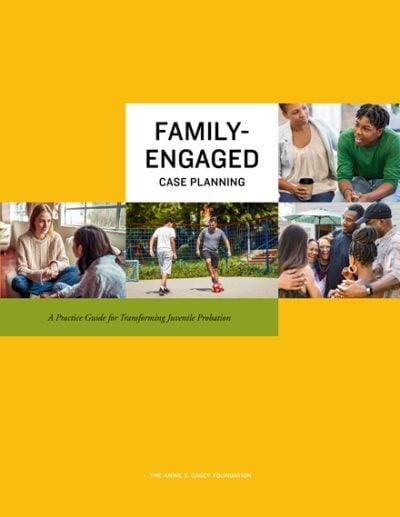Summary
This practice guide helps juvenile justice agencies institute family-engaged case planning in youth probation.
What is Family-engaged Planning
Family-engaged case planning is a new model for the initial stage of the juvenile probation process where juvenile probation officers formulate case plans by collaborating with young people and their families. This approach — and the Foundation’s larger vision for transforming juvenile probation — is necessary to align probation with powerful studies on adolescent brain development and effective responses to delinquent behavior.
Justice for Families, an organization made up of and led by family members of youth involved in the justice system, describes family engagement as “a meaningful partnership with families and youth at every level of the agency and system...[where] families are truly valued, and when they are appreciated as experts and critical stakeholders in the shaping of positive outcomes.”
Since parents and other family members have a substantial impact on a young person’s behavior — and since their involvement extends far beyond a young person’s probation period — it’s critical to enlist these members in the case planning process. Family engagement goes beyond interacting with, informing, requiring information or explaining things to families. Rather, family engagement involves true partnership. It requires probation personnel to seek advice and opinions from families, honor and respect their insight and perspective and treat them as essential participants in the development of their children’s case plans and the oversight of their children’s experience on probation.
A Dramatic Change
Probation is the most common disposition by far for young people who enter our nation’s juvenile justice systems, with more than a quarter million young people placed on some form of probation every year. But its fundamental structure and approach lead to practices that are counterproductive or at odds with the evidence. Probation also plays a large role in perpetuating the vast and continuing overrepresentation of Black, Latino and other youth of color in juvenile justice systems.
In many jurisdictions, standard probation practice amounts to no more than court-ordered conditions reiterated in a case planning document. Probation officers regularly exclude parents and family members from the case planning process. And, when probation officers do involve family members in aspects of their children’s cases, these interactions are often strained.
Inside the Guide
The practice guide opens with a summary of the Foundation’s vision for transforming juvenile probation. Section two explains why it’s vital for probation agencies to successfully engage and partner with families. Section three presents the core elements of the family-engaged case planning model. And the fourth and final section spells out ways of adapting family-engaged case planning to the culture and customs of a local jurisdiction.
The information presented in this guide is based on the early adoption of family-engaged case planning by New York City and other jurisdictions.
Tools to Support Family-Engaged Case Planning







